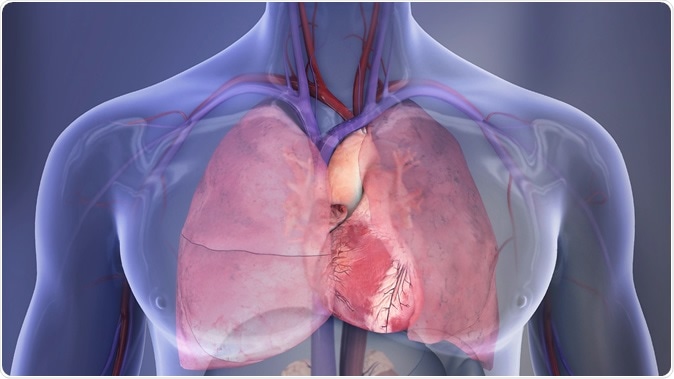According to preliminary research presented at the American Heart Association’s Scientific Sessions 2017, sexual activity is rarely associated with sudden cardiac arrest unlike suggested in popular fiction.
The researchers were attempting to see how many of the sudden cardiac arrests (where the heart stops beating suddenly leading to massive heart attack and sometimes life threatening consequences) were associated with sexual intercourse.
The study was sponsored by National Heart, Lung, and Blood Institute and led by Dr Sumeet Chugh Cedars-Sinai Heart Institute, Los Angeles, California.

Human Chest Cavity illustration: Right lung, left lung, heart. Copyright: American Heart Association
For this study the team looked at 4,557 cases of cardiac arrest among adults between 2002 and 2015 in a northwestern United States community in Portland, Oregon. Their results showed that of all these cases, only 34 occurred within one hour of sexual intercourse.
Men were more likely to have a cardiac arrest after sex (in 94 percent cases). Of the 34 cases, 32 were men. On looking at the gender of the affected persons, it was noted that while one in 100 cases of cardiac arrests in men is related to sexual activity, among women it is one in 1,000 cases.
Cardiac arrests were seen among patients aged 34 to 83 in this study. Due to embarrassment or shock or other reasons, only one third of the victims whose attacks were witnessed by their sexual partner actually received life saving CPR.
The researchers found that all patients with cardiac arrests had a previous history of heart disease and were also taking heart disease medications.
According to researchers, although cardiac arrest during sex is not a common phenomenon, the importance of performing CPR on these patients cannot be more emphasized. It is important that the public is aware that CPR can save the life of a victim irrespective of the circumstances when the arrest occurs.
According to Dr. Chugh, the lead investigator and a professor of medicine at Cedars-Sinai Heart Institute in Los Angeles, “On average in the US, only 10% or less actually survive a cardiac arrest.” He added that he and his team were fortunate that the whole community took part in this study. Most studies of this kind fail, he explained, because if 5,000 or 10,000 people are followed up for years, only a few develop cardiac arrest.
The team used the paramedics to conduct the interviews that provided them with answers as to how these cardiac arrests could have been triggered. Chugh said, “We learn from the medics. They tell us who had a cardiac arrest, and then we go back to the time that they were born, and we get their entire records.” Chugh said, “If this devastating event does occur, the partner should not hesitate to perform CPR since it will potentially increase the chances of survival.” His next part of the study, he said, was to include the 850,000 residents of Ventura County, California. He explained, “In the big picture, it is rare for sexual intercourse to be a trigger for sudden cardiac arrest.”